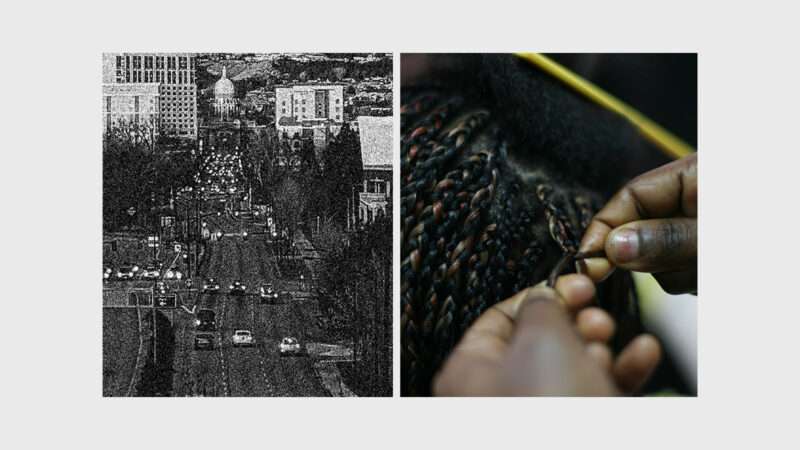
Tedy Okech, Charlotte Amoussou, and Sonia Ekemon have been practicing African-style hair braiding for a combined 60 years. Ekemon picked up the skill during her time in a refugee camp in Benin, while Okech learned how to braid hair to financially support her family while growing up in Sudan.
Okech, Amoussou, and Ekemon hoped to do the same in Idaho, but the state's costly and time-consuming licensing process has kept them from practicing their trade. With the help of the Institute for Justice, a libertarian public interest law firm, they're suing the Idaho Barber and Cosmetology Services Licensing Board for the right to make a living out of braiding hair.
"I have a mortgage and three little kids that I take care of and have to feed," said Ekemon at a press conference last week, according to The Washington Post. "This is what I have to do to feed my kids. I really need this."
Idaho is one of just five states that requires hair braiders to attain cosmetology licenses, which is a costly and lengthy process. Braiders must undergo 1,600 hours of training at a cosmetology school before completing a written and a practical exam. "Idaho does not require cosmetology schools to teach students African style braiding techniques and only two out of 110 questions on the written exam test students on braiding," wrote the Institute for Justice in a press release. "The practical exam does not cover braiding at all."
Idaho requires licenses for 67 of the 102 lower-income occupations surveyed by the Institute for Justice in its 2017 License To Work report, representing a serious roadblock for Idahoans hoping to improve their financial circumstances. The training mandated by the Idaho Barber and Cosmetology Services Licensing Board for a hair-braiding license costs as much as $20,000. Such barriers to entry are incredibly prohibitive for people who are low-income, immigrants, or looking to change careers, protecting incumbents while allegedly shielding consumers from risk. The Institute for Justice correctly points out how nonsensical it is for Idaho to invoke risk as a justification for hair-braiding regulations, given that the state does not require tattoo artists to be licensed.
Though occupational licenses are required supposedly in the name of preserving safety and standards in certain fields, the list of licensed professions—which varies from state to state—is often arbitrary. In Idaho, travel guides, barbers, makeup artists, naturopathic medicine practitioners, and shorthand reporters must all be licensed by the state, as must the more obviously risk-prone plumbers, veterinarians, nurses, and pharmacists. Idaho is also one of the two states that require licenses for log scalers, who estimate the value of logs. There is little rhyme or reason to the fees, education, experience, or exams required for each profession's licensing regime.
Following the Institute for Justice's lawsuit, state Rep. Colin Nash (D–Boise) introduced a bill that would lift licensing requirements for hair braiders. Nash said that the state "thought this had been fixed last year, but the Board of Cosmetology got slapped with a federal lawsuit," noting that he hoped the bill would help "avoid litigation surrounding that." Nash told the House State Affairs Committee that the legislation would "hopefully save the taxpayers some money, and get out of the way of private business owners who would like to engage in the practice of hair braiding."
The bill received unanimous support in the Idaho House and will now move to the Senate. For people like Okech, Amoussou, and Ekemon, who hope to professionally practice skills they acquired through informal pathways, work options are often limited by onerous licensing requirements. The latest legal and political action in Idaho could help reduce those difficulties.
The post These Hair Braiders Might Kill an Idaho Licensing Law That State Officials Admit Makes No Sense appeared first on Reason.com.







